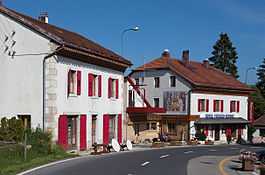La Cure
| La Cure | |
|---|---|
 | |
| Country | Switzerland |
| Canton | Vaud |
| District | Nyon |
| Coordinates | 46°46′N 6°08′E / 46.767°N 6.133°ECoordinates: 46°46′N 6°08′E / 46.767°N 6.133°E |
| Area | 0 km2 (0 sq mi) |
| Elevation | 1,028 m (3,373 ft) |
| Postal code | 1265 |
| Website | Cure.ch/ La Cure.ch Profile, SFSO statistics |
 La Cure | |
| Location of La Cure
| |
La Cure is a small village located five miles north of Geneva, Switzerland. Part of the village lies in Switzerland, and part in France, with the boundary dividing not only the village itself, but at least four structures within it. One of these structures is the Hotel Arbez, in which the dining hall and other rooms are bisected by the border.
History
Until 1862, La Cure was entirely in France. France and Switzerland had previously disputed possession of the strategically-important Vallée des Dappes, which was controlled by the latter until in 1862, the Swiss accepted an offer to exchange that territory for another piece just to the north and east; the new boundary was drawn directly through La Cure. According to the Treaty of Dappes, which formalized the swap, any buildings existing at the time that the new line was demarcated were not to be disturbed, even if the boundary bisected them.[1]
Today, the border passes through the Hotel Arbez (see below); in addition, it bisects at least two residences, and a pub.[2]
Hotel Arbez
Taking advantage of the delay between negotiation of the treaty and its final ratification by the Swiss Parliament, a local businessman named Ponthus constructed a new structure in 1863 on the new borderline.[3] Originally Ponthus operated a grocery store in the Swiss section of the building, with a bar in the French section, hoping to turn the cross-border business to his advantage.[4] In 1921, Jules-Jean Arbeze purchased the building, and turned it into a hotel.

Today, the Franco-Swiss border passes through the kitchen, dining room, hallway and several rooms of the hotel. In two rooms (including the honeymoon suite) the beds themselves are bisected by the boundary, while in another, the bathroom is in France, while the rest of the room is in Switzerland.[5][6]
During the German occupation of France in World War II, their troops were allowed to enter the French side of the hotel, but were strictly prohibited from crossing to the Swiss side. Since the stairway to the upper floor started in French territory but ended in Switzerland, the Germans were not permitted to access any of the upper rooms, which became a refuge for refugees and French Resistance members.[7] The hotel was chosen in 1962 for negotiation of the Évian Accords between France and Algeria, which resulted in the independence of the latter.[8]
References
See also
- Haskell Free Library and Opera House, a library located half in Derby Line, Vermont, USA and half in Stanstead, Quebec, Canada.
- Kalin Restaurant, article about the Kalin Restaurant in Obrezje, Slovenia, whose dining room is bisected by the border between that country and Croatia.
External links
- Hotel Arbez. Website for the hotel; primarily in French, with limited English translation.
- La Cure: Photos and Maps. Offers several large photos of the village and its buildings (with lines showing the border's location), as well as maps of the area.
- Hotel Arbez: Half in France and Half in Switzerland. Offers photos of the interior and exterior of the Hotel Arbez, with lines showing the precise location of the border in each.